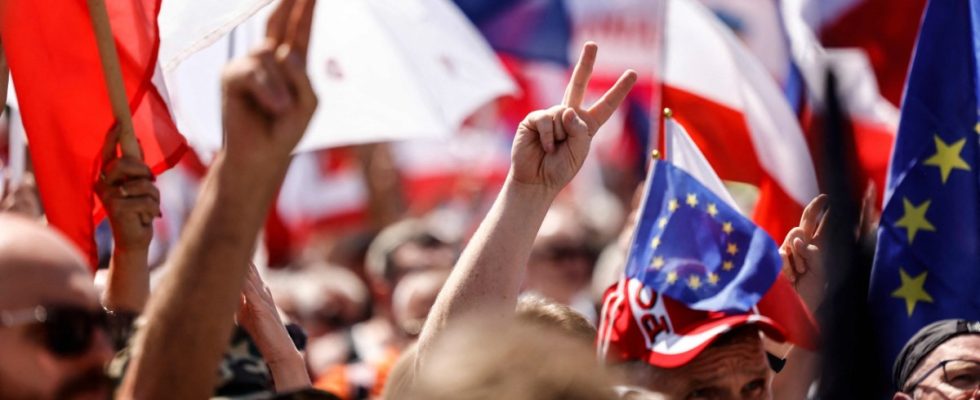It’s a folk festival atmosphere on the streets of the Polish capital. Waving flags and licking ice cream, children on their shoulders and placards in their hands, people parade through Warsaw’s city center on this Sunday afternoon. Donald Tusk, chairman of the largest Polish opposition party Civic Platform (PO) had called for the “Great March for Democracy”. In the early afternoon, the organizers announce the number of participants: 500,000 people.
Even the underground trains to the city center are hopelessly overcrowded, and people make fun of it, too, as if all this increases the anticipation. Before they patiently crowd onto the platforms, they queue up in front of the ticket machines, of which there seem to be far too few on this Sunday. It’s not just the people of Warsaw who followed Tusk’s call on this warm, early summer’s day. Tens of thousands traveled there in specially organized buses, trains and their own cars.
In the crowd in front of the Ministry of Justice is a group from Tarnowitz in Silesia, 300 kilometers away. The lies of the right-wing populist ruling party PiS can no longer be endured, it says in rhyme on their poster. “No, it’s not far at all,” says the man with the poster, who is wearing black clothes and has a full black beard. “After all, there’s a lot at stake.” If the PiS wins the parliamentary elections again in autumn, the country will slip into a dictatorship. The Lex Tusk was the decisive factor that he had now traveled to Warsaw.
Further explanations by the group are drowned out by loud speeches and music, the train sets off past Prime Minister Mateusz Morawiecki’s headquarters to the Presidential Palace and finally to the Royal Castle in Warsaw’s Old Town. At the forefront: former President Lech Wałęsa, former leader of Solidarność, which eventually brought down the communist regime.
The Commission should be able to exclude a politician from public office for up to ten years
Many posters are aimed directly at current President Andrzej Duda. “Read before you sign anything,” it says, for example. Duda had signed a law on Whit Monday, on the basis of which a commission to investigate Russian influence is to be set up. The PiS makes no secret of the fact that former Prime Minister Donald Tusk is said to be the first to be summoned, which is why the opposition calls it “Lex Tusk”. The text of the law reveals sheer arbitrariness: practically anyone can be appointed to the commission. Those summoned are forced to appear, and in the end the commission can decide to bar a person from public office for up to ten years. Andrzej Duda now wants to tone down this last point, it should only be a recommendation.
Donald Tusk is standing on Königsplatz in the early afternoon: “Our lack of strength gave them strength,” he exclaims. It is now time to stand together. “We go to these elections to win, to hold those responsible accountable, to right human wrongs and thereby reconcile Polish families,” Tusk told the crowd. “We will have different opinions, but we will respect each other.”
Not only in Warsaw, but also in other Polish cities, people demonstrated on Sunday for democracy, a European Poland, against the PiS government. Including in Kraków, Szczecin and Czestochowa. In the afternoon, some demonstrators marched again to Prime Minister Morawiecki’s office and to the home of PiS party leader Jarosław Kaczyński.
Morawiecki declared on Sunday that the “anti-government” march was by no means a civil protest, but was organized by “old foxes” from the opposition parties. In fact, numerous civil rights movements had joined Tusk’s call, including the so-called women’s strike and organizations that advocate an independent judiciary or equal rights for homosexuals.

